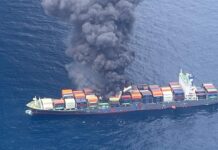
Increasing levels of rollover cargo at congested ports are continuing to prevent the smooth operation of global supply chains an Ocean Insights study has found.
Asian ports exporting to Europe and the US have seen a month-on-month rise in cargo delayed at ports during October, according to data analysis of more than one million data points, according to the data consolidation and analysis group for forwarders and shippers, Ocean Insights, which is based in Rostock Germany.
“Overall container rollover ratios at leading transhipment ports rose to 28.5% last month, up from 26.9% in September and 22.2% in October 2019,” according to Ocean Insights, which uses proprietary global container tracking data to make its observations.
“This is supposed to be container shipping’s seasonal lull after the summer peak season, but on some trade lanes freight rates are near record levels and ships are still departing Asia full,” said Josh Brazil, Chief Operations Officer at Ocean insights.

Brazil added that he believes container lines are trying to cope with critical box shortages in Asia but “this is putting more pressure on operations and freight rates”. And, with the redeployment of idle vessels carriers no longer have the option of adding capacity to the worst affected trades.
“I think what we are seeing is that the cargo pipeline has maxed out ocean supply chain capacity and this is being reflected in heightened rollover levels which translates into more disruption for shippers and forwarders,” said Brazil.
Singapore, the world’s second largest container hub, saw its rollover ratio increase to 31.1% in October from 30.2% in September. Ocean Insights calculated transhipment cargo as cargo arriving at the port, that was then shipped on an alternative vessel.

As reflected in the port data, most major container lines also saw their rollover ratios deteriorate during October. Ocean Insights calculates the rollover ratio for carriers as the percentage of cargo carried by each line globally that left a transhipment port on a different vessel than originally scheduled.









